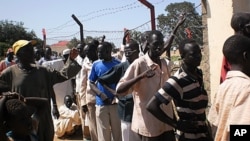GENEVA —
A new operation to airlift nearly 1,400 South Sudanese stranded in Sudan's capital, Khartoum, starts Tuesday. The airlift is organized by the International Organization for Migration (IOM) and the U.N. refugee agency (UNHCR) in collaboration with the governments of Sudan and South Sudan. Planes are to take off from Khartoum and fly to Aweil in South Sudan’s Northern Bahr El Ghazal State.
The International Organization for Migration reports two 47-seat charter flights will take off every day over the next two weeks. It says the planes will be carrying what it calls extremely vulnerable South Sudanese individuals and their families to their newly independent country.
IOM spokesman Jumbe Omari Jumbe says the 1,370 people who eventually will be returned home are among some 40,000 other South Sudanese who have been stranded in the north for the past two years. He says they have been living under precarious conditions out in the open since 2010 waiting to be transported home.
“Many gave up their jobs and homes in anticipation of the move and subsequently became stranded and at risk from prolonged exposure to the elements," said Jumbe. "Those whose health status puts them at high risk of developing complications if left living in the open or undertaking the arduous route -- journey to the South.”
Jumbe says those waiting to be transported to South Sudan include elderly and handicapped people, unaccompanied minors, vulnerable female headed households and pregnant women with medical complications.
More than 350,000 South Sudanese are believed to have returned to their home regions from Sudan since the South won its independence from the north in July, 2011. U.N. agencies estimate about one-half million South Sudanese remain in Sudan.
Jumbe says all the returnees are carefully screened to make sure they are going home of their own free will and to ensure that they are fit to travel.
“IOM and UNHCR in South Sudan will meet the returnees on arrival and provide initial medical assistance," said Jumbe. "Then IOM in close collaboration with the South Sudanese authorities will provide onward transportation to their final destinations.”
IOM Spokesman Jumbe says his organization is pleased that the ordeal will soon be over for those people who are part of this airlift. Unfortunately, he says no concrete plans exist to help some 39,000 South Sudanese left behind in the inhospitable open areas of Khartoum.
He says most of those who remain stranded wish to return to South Sudan, but do not have the means of making the long, hazardous journey and IOM does not have the money to assist them.
Until the money is found to help them return home safely, he says lifesaving humanitarian assistance and protection must continue.
The International Organization for Migration reports two 47-seat charter flights will take off every day over the next two weeks. It says the planes will be carrying what it calls extremely vulnerable South Sudanese individuals and their families to their newly independent country.
IOM spokesman Jumbe Omari Jumbe says the 1,370 people who eventually will be returned home are among some 40,000 other South Sudanese who have been stranded in the north for the past two years. He says they have been living under precarious conditions out in the open since 2010 waiting to be transported home.
“Many gave up their jobs and homes in anticipation of the move and subsequently became stranded and at risk from prolonged exposure to the elements," said Jumbe. "Those whose health status puts them at high risk of developing complications if left living in the open or undertaking the arduous route -- journey to the South.”
Jumbe says those waiting to be transported to South Sudan include elderly and handicapped people, unaccompanied minors, vulnerable female headed households and pregnant women with medical complications.
More than 350,000 South Sudanese are believed to have returned to their home regions from Sudan since the South won its independence from the north in July, 2011. U.N. agencies estimate about one-half million South Sudanese remain in Sudan.
Jumbe says all the returnees are carefully screened to make sure they are going home of their own free will and to ensure that they are fit to travel.
“IOM and UNHCR in South Sudan will meet the returnees on arrival and provide initial medical assistance," said Jumbe. "Then IOM in close collaboration with the South Sudanese authorities will provide onward transportation to their final destinations.”
IOM Spokesman Jumbe says his organization is pleased that the ordeal will soon be over for those people who are part of this airlift. Unfortunately, he says no concrete plans exist to help some 39,000 South Sudanese left behind in the inhospitable open areas of Khartoum.
He says most of those who remain stranded wish to return to South Sudan, but do not have the means of making the long, hazardous journey and IOM does not have the money to assist them.
Until the money is found to help them return home safely, he says lifesaving humanitarian assistance and protection must continue.




